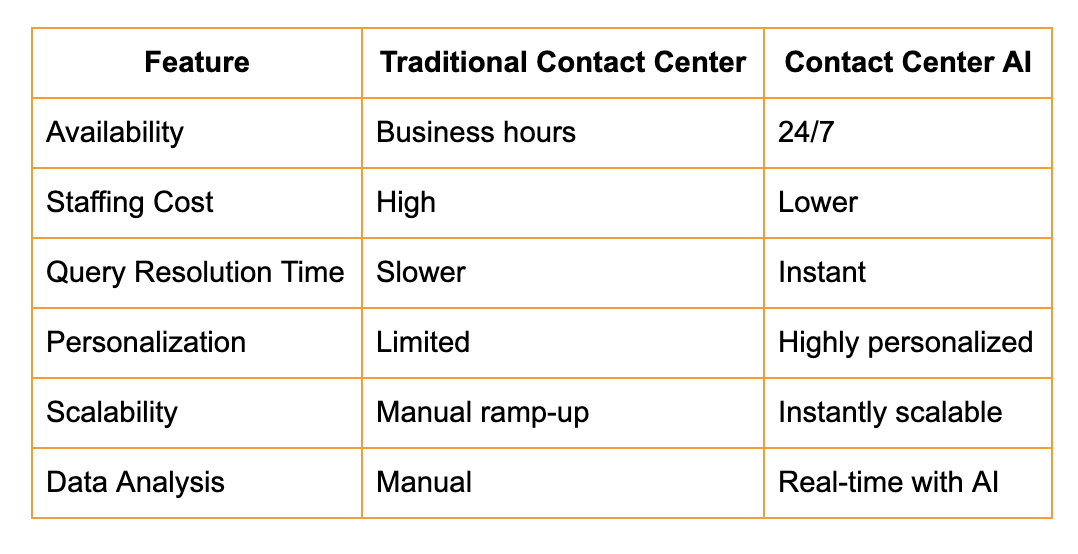.webp)
Shubham Patil
Chief Marketing Officer

Raj Solanki
Co-Founder
May 6, 2025

In an era where digital transformation is reshaping every industry, customer experience has emerged as the defining battleground for businesses. With customers demanding faster, smarter, and more personalized interactions, the traditional contact center is no longer enough. Enter Contact Center AI — an intelligent layer of automation and assistance that’s revolutionizing the way businesses interact with their customers.
Contact Center AI refers to the integration of artificial intelligence technologies—like machine learning, natural language processing (NLP), and speech recognition—into customer support environments. It enables automation of routine customer service tasks, assists human agents with real-time recommendations, and provides deep insights into customer behavior.
Rather than relying solely on human agents to manage large volumes of support calls, emails, or chats, businesses are now leveraging AI-powered systems such as virtual agents, AI chatbots, and voice bots. These systems can understand and process human language, making them capable of resolving common queries, guiding customers through workflows, or escalating complex issues to human representatives when necessary.
The benefits of implementing Contact Center AI go far beyond simple automation. It unlocks new levels of efficiency, accuracy, and scalability while enhancing the overall customer experience (CX).
One of the most compelling advantages of Contact Center AI is its ability to operate round-the-clock. Unlike human agents who work in shifts, AI systems never sleep, enabling businesses to offer 24/7 support without incurring additional staffing costs. This is especially beneficial for companies with a global customer base, where queries may come in at all hours.
AI tools can instantly understand customer intents and provide accurate responses or escalate issues based on urgency. This significantly reduces Average Handle Time (AHT) and ensures faster First Contact Resolution (FCR), two critical metrics in any customer service operation. According to a report by Deloitte, organizations using AI in contact centers have seen up to a 40% improvement in these key metrics.
AI doesn’t just answer questions—it remembers context, customer history, preferences, and behaviors. This means your customers won’t have to repeat themselves or start from scratch when reaching out. Over time, AI systems learn and adapt, offering increasingly personalized responses that can mirror human empathy and tone. This kind of intelligent response system can dramatically improve Customer Satisfaction (CSAT) scores and loyalty.
Traditional contact centers struggle to scale during seasonal spikes or promotional campaigns. AI-based contact centers, however, can handle thousands of concurrent interactions without performance degradation. Whether it's Black Friday for an e-commerce brand or open enrollment season for an insurance provider, AI ensures consistent performance at scale.
AI is not here to replace humans but to empower them. Agent-assist tools powered by AI can provide real-time recommendations, suggest helpful resources, and automatically transcribe calls. This not only improves the quality of service but also reduces the cognitive load on agents. Companies like Genesys have successfully demonstrated how AI-powered agent-assist tools can lead to a 25% improvement in agent productivity.
These are often the first point of contact for customers. Chatbots use NLP to understand customer queries and respond appropriately. Advanced bots can handle tasks like order tracking, payment processing, appointment scheduling, and even upselling.
Voice bots interpret spoken language and respond conversationally, allowing businesses to automate telephonic interactions. AI-driven speech analytics also assess tone, emotion, and sentiment, helping organizations measure customer experience in real time.
NLP allows machines to understand, interpret, and respond in human language. It powers both text and voice interactions in contact centers. With NLP, AI can handle complex customer queries that go beyond simple keyword matching.
Understanding how a customer feels is vital to delivering excellent support. Sentiment analysis evaluates whether a customer interaction is positive, negative, or neutral, helping agents prioritize and adjust their communication strategies accordingly.
AI can sift through thousands of interactions to identify patterns, detect anomalies, and forecast demand. This helps leaders make data-backed decisions and optimize resource allocation. For example, IBM Watson provides sentiment dashboards and real-time voice interaction analytics to enhance contact center performance.
Retailers use AI to handle inquiries about products, deliveries, and returns. Bots can suggest products based on browsing history and even upsell by offering personalized discounts. A great example is H&M, which uses AI chatbots to assist customers with outfit choices and store locations.
In highly regulated sectors, Contact Center AI helps with KYC verification, balance inquiries, fraud detection, and even automated onboarding. Banks like Bank of America use their AI assistant “Erica” to manage over 1 billion customer interactions annually.
Hospitals and clinics employ AI to manage appointment scheduling, medication reminders, insurance verifications, and patient triage. Contact Center AI has played a crucial role in reducing administrative burden in healthcare while ensuring patients receive timely assistance.
AI helps travelers with itinerary updates, cancellations, travel documentation, and FAQs. Airlines like KLM and Emirates now rely heavily on AI-powered WhatsApp bots to assist international travelers seamlessly.
Here’s a comparison of how Contact Center AI stacks up against traditional call center setups:

If you're exploring AI-powered solutions, consider these market leaders:
Before implementation, clearly outline what you want AI to achieve—be it reducing call volume, increasing CSAT scores, or improving lead conversion rates.
Evaluate platforms based on integration capabilities, scalability, multilingual support, and data security. Ensure the tools can plug into your existing CRM, helpdesk, or marketing automation software.
Custom AI models must be trained with historical data and real customer interactions. Over time, they’ll improve through machine learning and feedback loops.
Don't replace your human agents entirely. Instead, strike a balance—let AI handle repetitive tasks and empower agents to manage complex or sensitive queries with empathy.
Regularly review KPIs such as resolution time, bot containment rate, and customer sentiment. Use analytics dashboards to continuously fine-tune AI performance.
Looking ahead, we can expect Contact Center AI to evolve into even more intuitive, emotionally aware, and predictive systems. Voicebots will get better at detecting stress or urgency in a caller’s tone. AI will preemptively offer solutions based on browsing behavior or purchase history. Integrations with Generative AI will allow bots to craft highly natural, context-rich conversations on the fly.
Moreover, as 5G networks and edge computing become mainstream, real-time AI applications will become faster and more responsive than ever before.
Contact Center AI is not just a passing trend—it’s the future of customer service. Businesses that adopt it early stand to gain significantly in terms of cost savings, customer satisfaction, and competitive edge. Whether you’re an SMB or an enterprise, now is the time to invest in intelligent contact center solutions that deliver results at scale.
As customer expectations continue to rise, so must your ability to meet them—intelligently, efficiently, and empathetically.
Swiftsell can help your business integrate AI-powered contact center solutions that work seamlessly across WhatsApp, website chat, Instagram, and more. Get in touch with us today and discover how we can elevate your customer experience.